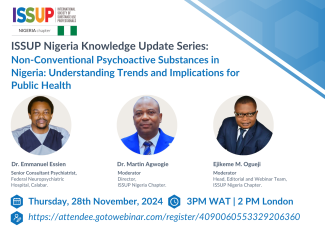ISSUP Nigeria Knowledge Update Series (25th Session): Non-Conventional Psychoactive Substances in Nigeria: Understanding Trends and Implications for Public Health

ISSUP Nigeria would like to invite you to the 25th session of its bi-monthly webinar in the Knowledge Update Series. This webinar will focus on the topic of 'Non-Conventional Psychoactive Substances in Nigeria: Understanding Trends and Implications for Public Health'.
Date: 28th November 2024
Time: 3:00 PM WAT | 2:00 PM London
This webinar will provide a comprehensive overview of non-conventional psychoactive substances in Nigeria. Key aspects covered include categories of substances, current research findings, existing gaps in research, associated health and social implications, and policy recommendations. Categories to be reviewed are:
- New psychoactive substances like synthetic cannabinoids, DIY highs
- Emerging drugs like Trihexyphenidyl, Flunitrazepam
- New Inhalants, e.g. vulcanising rubber, Soakaway pit fumes.
- Traditional or Indigenous Substances e.g. Lizard dung, datura metel plant .
Discussion Topics:
- What are the mechanisms of action behind these substances?
- Where do research gaps exist in understanding non-conventional substance use?
- What are the health, social, and legal implications of these substances?
- What challenges do we face in regulating and addressing non-conventional substance use in Nigeria?
Interactive Elements:
- Polls/Surveys: Brief polls on participants’ familiarity or experiences with the substances covered in the presentation.
- Q&A Session: Opportunities for participants to ask questions after the presentation
Relevance and Significance:
- This presentation addresses a pressing public health issue in Nigeria. Non-conventional substance use primarily affects youth in Nigeria, it is challenging to regulate, and has profound implications for physical and mental health, public safety, and community welfare. Understanding these trends and existing knowledge gaps can help stakeholders further explore these issues and develop effective interventions and policies.
Target Audience:
- Public health professionals, practitioners, policymakers, and community leaders, ISSUP members.
Learning Outcomes:
Following this webinar, participants will be able to:
-
Identify and categorise common non-conventional psychoactive substances used in Nigeria, including synthetic and plant-based drugs.
-
Explain the mechanisms of action of these substances on the brain and body.
-
Analyse current research gaps regarding non-conventional substance use and its implications.
-
Evaluate the health, social, and legal implications of these substances within Nigerian communities.
-
Propose evidence-based policies and strategies to address the challenges associated with non-conventional substance use in Nigeria.
Presenter:
Dr. Emmanuel Essien
Dr. Emmanuel Essien is a Senior Consultant Psychiatrist in the Drug Abuse Treatment, Education, and Rehabilitation (DATER) unit at the Federal Neuropsychiatric Hospital, Calabar, where he also completed his psychiatry residency training. He received his medical degree from the College of Medical Sciences, University of Calabar, and earned a Fellowship with the West African College of Physicians (Faculty of Psychiatry) in 2015. Dr. Essien has held key leadership roles, including a five-year tenure as Head of Training and Research, and currently serves as Head of Clinical Services at the hospital. He is also an International Certified Addiction Professional (ICAP II).
With a strong interest in public health and epidemiological research, Dr. Essien completed his Master’s in Public Health with distinction from the University of Manchester. His dedication to research and editorial expertise are further demonstrated through his roles as Editor-in-Chief of the Cross River Journal of Medicine and Deputy Editor of the Nigerian Journal of Psychiatry.
An Adjunct Senior Lecturer in Psychiatry at the University of Calabar, Dr. Essien supports training in research and clinical skills. His research spans key mental health areas, including anxiety, depression, and substance abuse, and he has numerous publications in both local and international journals.
Moderators:
Dr. Martin O. Agwogie
Director, ISSUP Nigeria Chapter
Ejikeme M. Ogueji
Head, Editorial and Webinar Team, ISSUP Nigeria Chapter
References:
-
Veta, D.O. Local substances used in Ilorin South Local Government Area of Kwara State, Nigeria. J Subst Use. 2024 Sep 2;29(5):730–735.
-
Aliyu, D., Taiwo, A., Omoniyi, S. Nonconventional use of substances among youth in Nigeria: Viewpoints of students in a Nigerian tertiary institution. J Nurs Care. 2015 Jan 1;4(1):.
-
Okeleji, L.O., Ajayi, A.F. Addressing the misuse and abuse of trihexyphenidyl. Asian J Psychiatry. 2024 Dec 1;102:104284.
-
Dumbili, E.W., Odeigah, O.W. Prescription opioids and new psychoactive substances use in Nigeria: A systematic review and policy implications. [Internet]. OSF; 2023 [cited 2024 Oct 30]. Available from: https://osf.io/e8gaq
-
Dumbili, E.W., Ebuenyi, I.D., Ugoeze, K.C. New psychoactive substances in Nigeria: A call for more research in Africa. Emerg Trends Drugs Addict Health. 2021 Jan 1;1(1):100008.
-
Jatau, A.I., Sha'aban, A., Gulma, K.A., Shitu, Z., Khalid, G.M., Isa, A., et al. The burden of drug abuse in Nigeria: A scoping review of epidemiological studies and drug laws. Public Health Rev. 2021 Jan 29;42:1603960.
-
Okafor, C.J., Essien, E.A., Edet, B.E., Okoro, A.C., Udofia, O. Drugs of abuse among in-patients receiving treatment for substance use disorders in a tertiary health care center in South-South Nigeria: An exploratory qualitative study. West Afr J Med. 2022 Feb 1;39(2):147–153.
Webinars and online events delivered and hosted by the International Society of Substance Use Professionals (ISSUP) are provided for informational purposes only. They are educational in nature and do not constitute medical advice, diagnosis or treatment.
